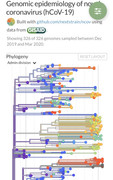nzjrs wrote: ↑12 Mar 2020, 12:02
Wynters wrote: ↑12 Mar 2020, 11:53
I think there's a significant difference between Greenland and Singapore, or Italy and the DRC. Population density, information dissemination tools, local culture and healthcare provision will all play a significant role (see the recent Ebola outbreaks as an example).
My posts were a play in 3 acts. If we all sit there on our thumbs 'its just a cold', then we all follow the curve because the innate dynamics of the virus will dominate (as it did with Ebola, nice and deadly that one). The countries that have managed to bend the curve have taken suppression of transmission seriously.
I would recommend slightly more fact in your early acts, in that case, as otherwise you might find the denouement has been robbed of weight.
There is also a world of difference between ignoring it and locking down the entire country. Both of those will have significant impacts that will kill people, simply in different ways. Each country has to walk a delicate tightrope.
Whilst I used Ebola as an example of how it spreads and impacts different countries differently depending on variations in socio, economic and geogrpahic environment, it's not a good comparison with our current situation as it's too deadly. It'll be interesting to see how our actions impact which mutations of the virus take root. It's possible it will mutuate to match Ebola's mortality rate (although that willl significantly hinder it's ability to propagate), but hopefully the approach of trying to limit transmission will see the strains that emphasise transmission becoming dominant. Yes, it means that those strains will likely become endemic to the global populace, but it will also significantly lower the mortality rate and, as we're in pandemic status already, that seems preferable. If nothing else, Healtchare systems will be better positioned to respond if they have a sustained period of time to treat people.


